|
|
|
Sort Order |
|
|
|
Items / Page
|
|
|
|
|
|
|
| Srl | Item |
| 1 |
ID:
175700


|
|
|
|
|
| Summary/Abstract |
The emotional dimension of the human element of war remains understudied. This article explores war’s fundamental cognitive frame of mind, adversariality, with a focus on its emotional thread, in the context of battle and war termination. Adversariality itself is discussed with specific reference to Clausewitz before key emotional aspects—emotion causation and consequence, and stress, anger, and fear—are explored from the perspective of the emotions sciences literature. Finally, three brief historical cases demonstrate the importance of the emotional side of strategy: Königgratz campaign in 1866, Germany’s defensive campaign in 1918, and the War of the Spanish Succession.
|
|
|
|
|
|
|
|
|
|
|
|
|
|
|
|
| 2 |
ID:
175679


|
|
|
|
|
| Summary/Abstract |
This article shows that all four Nordic countries, i.e., Denmark, Finland, Norway and Sweden, have adjusted their alignment strategies when responding to the changes in their external environment during the twenty-first century. Furthermore, our findings indicate a great diversity among the four states in their responses. All too often, security policy analyses cluster small states into allies and non-allies, respectively. However, this article suggests that alliance affiliation in isolation is not sufficient for explaining small states’ behavior and adjustments of their strategies. Occasionally, previous experiences of armed conflicts as well as perceptions of strategic exposure provide stronger explanatory power.
|
|
|
|
|
|
|
|
|
|
|
|
|
|
|
|
| 3 |
ID:
175669


|
|
|
|
|
| Summary/Abstract |
The contemporary U.S.-Russian relationship is often characterized as a return to the worst tensions of the Cold War, with the accompanying prospect of global nuclear conflict. Yet although the danger of conflict is real, changes to the strategic environment call into question the wisdom of U.S. Cold War-era containment strategies. U.S. strategy toward Russia must account for a rising China, increased asymmetry between U.S. and Russia in both capabilities and demographic potential, and increased Russian reliance on China and the EU for economic viability. In this light, the U.S. should reevaluate vital interests within countries bordering Russia, and carefully craft a sustainable long-term sanctions regime which is likely to moderate–rather than exacerbate–Russia’s assertive foreign policy.
|
|
|
|
|
|
|
|
|
|
|
|
|
|
|
|
| 4 |
ID:
175681


|
|
|
|
|
| Summary/Abstract |
I hesitated to write the introduction to this Special Issue of Comparative Strategy, which features articles on a variety of subjects, all written by women. I did not want to misstep. I thought, my perspective is decidedly male, and, frankly, it is impossible for me to fully understand the level of inequality women have experienced through the ages. My first reaction was to pass the assignment off to a female colleague of mine. She did not take me up on my offer. She thought, actually, it might be good to have a male perspective because male attitudes and responses are critical to overcoming prejudices that exist against women in the field. Good point. After giving it more thought and taking a little encouragement from Martin Luther King, Jr., I decided that perhaps the best thing I could do is to emphasize something that I have believed to be true all along, that what matters most is a person’s character and natural strengths, and not a person’s gender.
|
|
|
|
|
|
|
|
|
|
|
|
|
|
|
|
| 5 |
ID:
175699
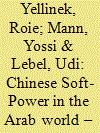

|
|
|
|
|
| Summary/Abstract |
Confucius Institutes are one of the major ways China invests Soft-Power in the world. This paper will examine the Confucius Institutes in universities in Arabic speaking countries from 2006 to 2020. It will focus on the response and reception of China’s Soft-Power in these countries. An initial index for examining the success of these institutes will be offered, which can also be applied to educational-cultural institutes in general. The following review and analysis of data point to the conclusion that Confucius Institutes, as a tool of Chinese Soft-Power, have effectively penetrated the Arab world and are welcomed without significant criticism.
|
|
|
|
|
|
|
|
|
|
|
|
|
|
|
|
| 6 |
ID:
175665


|
|
|
|
|
| Summary/Abstract |
The moral permissibility of possessing and employing nuclear weapons is something with which Christians have long wrestled. At least three distinct approaches exist to addressing the use of nuclear weapons within broader Christian thought. The three explored here are those of the United Methodist Council of Bishops, the National Conference of Catholic Bishops, and of extreme Christian Apocalypticists. Although these approaches are each rooted in Christian principles, each exhibits unique strengths and weaknesses and leads to a different conclusion. Instead, Prudential Christian Realism is suggested as an approach worthy of discussion given today’s global security environment.
|
|
|
|
|
|
|
|
|
|
|
|
|
|
|
|
| 7 |
ID:
175701
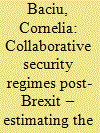

|
|
|
|
|
| Summary/Abstract |
Drawing on theories of international regimes and game theoretical approaches this article analyzes the level of overlap in national security strategies, seeking to explore the potential of convergence in security and defense cooperation in Europe post Brexit. It investigates two research questions: 1. What is the potential for future security cooperation in the Euro-Atlantic space post-Brexit? and 2. What areas are more prone to collaboration? The paper applies cluster analysis and a comparative design, using national security strategies as units of study. It finds that there is potential for future convergence between EU27 and the UK at the industrial level, in internal security matters and EU missions.
|
|
|
|
|
|
|
|
|
|
|
|
|
|
|
|
| 8 |
ID:
175703
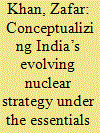

|
|
|
|
|
| Summary/Abstract |
As India intends to complete its ambitious deterrent force projects such as the development of Ballistic Missile Defense (BMD) system, Intercontinental Ballistic Missiles (ICBMs), Multiple Independently Reentry Vehicles (MIRVs), nuclear powered submarines, aircraft carrier, and a number of nuclear reactors as part of its would-be modified Draft Nuclear Doctrine (DND), it is imperative to analyze whether or not India’s shift in its deterrent force posture including that of ambitious deterrent force projects remains consistent with minimum deterrence India earlier conceptualized. This article conceptualizes the rationale of India’s evolving nuclear strategy under the conceptual essentials of minimum deterrence and the limitations to and challenges of India’s ambitious deterrence force posture. Also, the article explores the key factors how and why India might be shifting away from its deterrent force posturing it earlier conceived. However, this article finds that India may not remain consistent with its broader nuclear policy of minimum deterrence conceptualized in its earlier nuclear drafts if it continues to successfully develop these mega deterrent force projects bolstered by sophisticated delivery systems amidst India’s increasing strategic partnership with the US.
|
|
|
|
|
|
|
|
|
|
|
|
|
|
|
|
| 9 |
ID:
175674


|
|
|
|
|
| Summary/Abstract |
This study looks at the challenge that cryptocurrencies could pose to national security as it pertains to terrorism. The study begins by untangling what are cryptocurrencies before shifting attention to how criminal use cryptocurrencies and how terrorist could use cryptocurrencies. One of the key issues identified is the lack of an international regulatory regime, including, a definition of what are cryptocurrencies and how one could regulate the sector. By engaging in such research, this study seeks to encourage international society to focus more on cryptocurrencies and develop an effective, binding regulatory regime.
|
|
|
|
|
|
|
|
|
|
|
|
|
|
|
|
| 10 |
ID:
175684


|
|
|
|
|
| Summary/Abstract |
The United States Intelligence Community (IC)—like all other organizations—is subject to shortcomings. While nuclear intelligence collection was the bread and butter of the IC during the Cold War, shifting national security priorities have diminished the IC's ability to conduct nuclear intelligence. Although nuclear intelligence collection remains an integral part of the IC and offices focused on countering nuclear proliferation still exist within the IC, competing intelligence collection priorities have left nuclear intelligence capabilities at a fraction of what they used to be, without the budget, personnel, or scientific expertise it once had. While the priorities of the IC have shifted toward concerns such as terrorism, renewed great power competition with Russia and China, and cyberwarfare over the past two decades, other nations have continued to grow the nuclear weapons capabilities that exist and develop new nuclear weapons capabilities. The threat of new and improved nuclear capabilities comes both from other great powers with established nuclear weapons programs, such as both Russia and China, and also from rogue states that are seeking to develop their own nuclear weapons and resisting international oversight of their nuclear weapons programs, like the cases of both Iran and North Korea, as well as previous cases in South Africa and Libya. While foreign nations have continued to pursue new nuclear weapons capabilities, the focus of the IC has been elsewhere—leaving our nuclear intelligence collection apparatus underfunded and lacking in the scientific expertise that is needed to fully understand the extent of new capabilities that have been developed since the end of the Cold War. In order to close this gap in knowledge, the IC must not only re-emphasize the importance of nuclear intelligence but also revitalize its nuclear intelligence collection apparatus in order to understand foreign nations new capabilities as they emerge.
|
|
|
|
|
|
|
|
|
|
|
|
|
|
|
|
| 11 |
ID:
175678
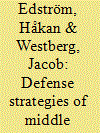

|
|
|
|
|
| Summary/Abstract |
Do middle powers develop similar defense strategies? Is middle powers a useful category for exploring the diversity of strategies among different categories of states? This article presents a great variation of strategies among the selected cases. Concurrently, similarities between middle powers belonging to similar regional security complexes (RSC) are revealed. The higher degree of great power penetration into a RSC, the lesser options for middle powers to develop individual strategies and vice versa. Furthermore, by comparing our findings with the strategies of more and less resourceful states, common elements among middle powers in terms of ends, means and ways, appear.
|
|
|
|
|
|
|
|
|
|
|
|
|
|
|
|
| 12 |
ID:
175673


|
|
|
|
|
| Summary/Abstract |
Following the Persian Gulf War, many asserted that the American military exorcized the demons of the Vietnam War. It was inappropriate to make this claim since the war was reminiscent of the conventional conflicts the United States was involved in earlier in the twentieth century. While examining America’s unconventional conflicts since the failure in Vietnam, one recognizes Washington is still having trouble dealing with them. It is especially difficult for the world’s lone superpower to establish stability in the nations where fighting is taking place. Certain officials in the U.S. government believe residual forces can produce order over the course of time. Within this article, though, it will be demonstrated that residual forces seldom generate such an outcome.
|
|
|
|
|
|
|
|
|
|
|
|
|
|
|
|
| 13 |
ID:
175683
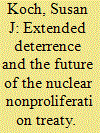

|
|
|
|
|
| Summary/Abstract |
Extended deterrence was a major pillar of the NPT at its origin. As the Soviet threat diminished and then disappeared, this was forgotten by most policy makers and observers. Recently, the role of extended deterrence in preventing nuclear proliferation has regained much of its salience. Two factors are responsible for that change: the growing threats from Russia, China and North Korea; and increasing allied doubts about the solidity of U.S. security commitments. While allied acquisition of nuclear weapons does not appear imminent, that danger could increase unless the United States reinforces its security commitments in word and deed. Failing that, the future of the NPT may be bleak.
|
|
|
|
|
|
|
|
|
|
|
|
|
|
|
|
| 14 |
ID:
175667
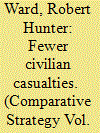

|
|
|
|
|
| Summary/Abstract |
In response to World War II's immense collateral damage from airpower, the United States implemented laws, policies, strategies, and technologies to protect civilians during war. When advanced technology began to promise pilot safety and precision, the public’s intolerance of military casualties transferred to an intolerance of foreign civilian casualties as well. As the military creates more collateral-damage safeguards, Americans grow more averse to operations endangering foreign civilians. Consequently, policymakers have less freedom to use force as needed, introducing a constraint on the use of force. As activity in cyberspace amplifies and space becomes a warfighting domain, increased “risk-free” warfare presents a heightened danger that this constraint will jeopardize national security.
|
|
|
|
|
|
|
|
|
|
|
|
|
|
|
|
| 15 |
ID:
175676
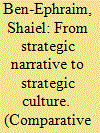

|
|
|
|
|
| Summary/Abstract |
Israeli strategic culture is offensive and militaristic. However, in the pre-state period the Labor Zionist elites which later dominated the Israeli security establishment formulated a security narrative trumpeting a defensive and antimilitaristic approach. This article explains that its security policy was designed to perpetuate domestic political hegemony. Since the Jewish people had not developed an approach to the use of force in centuries, the formulation of Labor Zionist approaches to security allows an insight into the process by which security narratives are initially derived and the process by they may (or may not) become a reified strategic culture.
|
|
|
|
|
|
|
|
|
|
|
|
|
|
|
|
| 16 |
ID:
175694
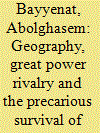

|
|
|
|
|
| Summary/Abstract |
This paper examines how buffer status or geographic location between two rival great powers, namely Imperial Britain and Russia, affected Iran’s survival chances from 1860 to 1914. By unpacking survival status into juridical sovereignty and domestic state autonomy, and systematically tracing the dynamics of rivalry between Britain and Russia over Iran, this paper demonstrates that buffer status contributed to the preservation of Iran’s juridical sovereignty while constraining its domestic state autonomy. In essence, it argues that due to the divergent preferences of rival great powers and the shifting balance of power between them, buffer status left Iran juridically sovereign but empirically non-sovereign.
|
|
|
|
|
|
|
|
|
|
|
|
|
|
|
|
| 17 |
ID:
175670


|
|
|
|
|
| Summary/Abstract |
This article examines the roles of nationalism, the historical case of World War One, and the Cult of the Offensive in explaining the growing conflict in the South China Sea. The article pays greatest attention to China and the United States in their respective roles as rising great power and hegemon. The article posits that nationalism may be dangerously out of control in China today. It critically examines those arguments claiming the World War One analogy is inappropriate, and concludes the “Great War” holds both applicable and inapplicable lessons. Finally, the article examines the Cult of the Offensive and argues this lens is particularly helpful in understanding the drive to conflict in the South China Sea.
|
|
|
|
|
|
|
|
|
|
|
|
|
|
|
|
| 18 |
ID:
175689
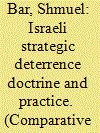

|
|
|
|
|
| Summary/Abstract |
Israel is the only country whose neighbors have threatened it for most of its existence with total eradication. Despite Israel’s military advantages, Israel’s defense doctrine views war as the “no choice option” which carries a heavy social and economic price tag. Therefore, Israeli doctrine relies heavily on the projection of deterrence. Events over the years have given rise to debates in the Israeli public regarding the “erosion” of Israeli deterrence. However, these debates are replete with fallacies. An understanding of Israeli deterrence doctrine must be based on the distinction between three national situation levels in the context of which deterrence must be achieved: “Routine”, “Emergency” and “War” and the role of “compellence” and pre-emption of offensive capabilities of the enemy as an instrument for inducing deterrence (“pre-terrence”). Ultimately, Israel has succeeded in maintaining strategic deterrence vis-à-vis neighboring states. This article provides an understanding of the evolution of Israel’s deterrence doctrine, its successes and its failures, and, mutatis mutandis, lessons that it can offer to deterrence doctrine in general and to that of the United States in particular.
|
|
|
|
|
|
|
|
|
|
|
|
|
|
|
|
| 19 |
ID:
175682


|
|
|
|
|
| Summary/Abstract |
China has relentlessly pursued its objective of absorbing Taiwan. While the unification was once advocated by both the mainland and Taiwan, in recent decades the two have grown apart. Taiwan has become a thriving democracy while China has increased its intolerance of free speech, thought, religion, and association. The current policy of ambiguity, by which the unification issue is left for the future, is under stress as China ratchets up its political warfare and military threats against Taiwan. It is time for a thorough review of options to keep the current commitment to peaceful resolution of the unification issue and to determine how best to assure survival of Taiwan’s democracy.
|
|
|
|
|
|
|
|
|
|
|
|
|
|
|
|
| 20 |
ID:
175680


|
|
|
|
|
| Summary/Abstract |
In an effort to strengthen the principal tenet of shared understanding in mission command, the following article advocates the selective teaching of philosophy be included in the training of military commanders. The article introduces a brief but relevant philosophical context, from Plato to Machiavelli, to distinguish both the potency of liberal education and its ability to develop shared understanding and trust between commanders. The evolving landscape of military operations in the Information Age entails a growing need for officers to think critically and act quickly, thus lending authority to the argument that philosophical understanding can eliminate potential shortcomings of otherwise inadequately implemented mission command.
|
|
|
|
|
|
|
|
|
|
|
|
|
|
|
|
|
|
|
|
|